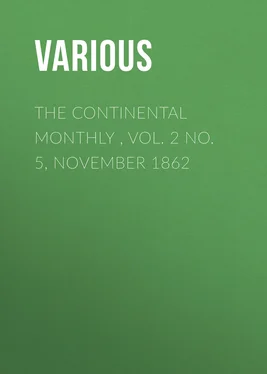Various - The Continental Monthly , Vol. 2 No. 5, November 1862
Здесь есть возможность читать онлайн «Various - The Continental Monthly , Vol. 2 No. 5, November 1862» — ознакомительный отрывок электронной книги совершенно бесплатно, а после прочтения отрывка купить полную версию. В некоторых случаях можно слушать аудио, скачать через торрент в формате fb2 и присутствует краткое содержание. Жанр: foreign_antique, periodic, Языкознание, Политика, foreign_edu, на английском языке. Описание произведения, (предисловие) а так же отзывы посетителей доступны на портале библиотеки ЛибКат.
- Название:The Continental Monthly , Vol. 2 No. 5, November 1862
- Автор:
- Жанр:
- Год:неизвестен
- ISBN:нет данных
- Рейтинг книги:3 / 5. Голосов: 1
-
Избранное:Добавить в избранное
- Отзывы:
-
Ваша оценка:
- 60
- 1
- 2
- 3
- 4
- 5
The Continental Monthly , Vol. 2 No. 5, November 1862: краткое содержание, описание и аннотация
Предлагаем к чтению аннотацию, описание, краткое содержание или предисловие (зависит от того, что написал сам автор книги «The Continental Monthly , Vol. 2 No. 5, November 1862»). Если вы не нашли необходимую информацию о книге — напишите в комментариях, мы постараемся отыскать её.
The Continental Monthly , Vol. 2 No. 5, November 1862 — читать онлайн ознакомительный отрывок
Ниже представлен текст книги, разбитый по страницам. Система сохранения места последней прочитанной страницы, позволяет с удобством читать онлайн бесплатно книгу «The Continental Monthly , Vol. 2 No. 5, November 1862», без необходимости каждый раз заново искать на чём Вы остановились. Поставьте закладку, и сможете в любой момент перейти на страницу, на которой закончили чтение.
Интервал:
Закладка:
Prosperity had made him giddy. Cotton was not merely King—it was God. Moral considerations were nothing. The sentiment of right, he argued, would have no influence over starving operatives; and England and France, as well as the Eastern States of the Union, would stand aghast and yield to the masterstroke which should deprive them of the material of their labor. Millions were dependent on it in all the great centres of civilization, and the ramifications of its power extended into all ranks of society and all departments of industry and commerce. It was only necessary to wave this imperial sceptre over the nations, and all of them would fall prostrate and acknowledge the supremacy of the power which wielded it. Nothing could be more plausible than this delusion. Satan himself, when about to wage war in heaven, could not have invented one better calculated to marshal his hosts and give promise of success in rebellion against the authority of the Most High. But alas! the supreme error of this anticipation lay in omitting from the calculation all power of principle. The right still has authority over the minds of men and in the counsels of nations. Factories may cease their din; men and women may be thrown out of employment; the marts of commerce may be silent and deserted; but truth and justice still command some respect among men, and God yet remains the object of their adoration.
Drunk with power and dazzled with prosperity, monopolizing cotton, and raising it to the influence of a veritable fetich, the authors of the rebellion did not admit a doubt of the success of their attack on the Federal Government. They dreamed of perpetuating slavery, though all history shows the decline of the system as industry, commerce, and knowledge advance. The slaveholders proposed nothing less than to reverse the currents of humanity, and to make barbarism flourish in the bosom of civilization. They even thought of extending the system, by opening the slave trade and enlarging the boundaries of their projected empire, Mexico and Central America, Cuba and St. Domingo, with the whole West Indian group of islands, awaited the consolidation of their power, and stood ready to swell the glory of their triumph.
But these enticing visions quickly faded away from their sight. At an early day after the inauguration of their government, they were compelled to disavow the design of reopening the slave trade, and in no event is it probable their recognition will be yielded by foreign governments, except on the basis of ultimate emancipation. How such a proposition will be received by their deluded followers, remains yet to be ascertained by an experiment which the authors of the rebellion will be slow to try among their people. One of the most effective appeals made to the non-slaveholders of the South, in order to start the revolution, was to their fears and prejudices against the threatened equality and competition of the emancipated negro. The immense influence of this appeal can scarcely be estimated by those not intimately acquainted with the social condition of the great mass of the Southern people. Among them, the distinction of color is maintained with the utmost rigor, and the barrier between the two races, social and political, is held to be impassable and eternal. The smallest taint of African blood in the veins of any man is esteemed a degradation from which he can never recover. Toward the negro, as an inferior, the white man is often affable and kind, cruelty being the exception, universally condemned and often punished; but toward the black man as an equal, an implacable hostility is instantly arrayed. This intense and unconquerable prejudice, it is well known, is not confined wholly to the South; but it prevails there without dissent, and is, in fact, one of the fundamental principles of social organization.
When, therefore, the leaders of the rebellion succeeded in persuading the Southern masses that the success of the Republican party would eventually liberate the slave and place him on an equality with the whites, an irresistible impulse was given to their cause. To the extent that this charge was credited was the rebellion consolidated and embittered. Had it been universally believed, there would have been few dissenting voices throughout the seceding States. All would have rushed headlong into the rebellion. And even now, every measure adopted on our part, in the field or in Congress, which can be distorted as looking to a similar end, must prove to be a strong stimulus in sustaining and invigorating the enemy. Happily, while the system of slavery naturally discourages education, and leaves the mass of whites comparatively uninformed, and peculiarly subject to be deceived and misled, there are yet many highly intelligent men among the non-slaveholders, and some liberal and unprejudiced ones among the slaveholders themselves. These serve to break the force of the appeals made to the ignorant, and they have had a powerful influence in maintaining the love of the Union and the true spirit of our institutions, among considerable numbers, in all parts of the South.
From the foregoing views, it is plain, that only in a certain sense can slavery be pronounced the cause of the rebellion. It was not the first and original motive; neither is it the sole end of the conspirators. But in another sense, it may justly be considered the cause of the war; for without it, the war could never have taken place.
There was no actual necessity to destroy the Union for the protection of slavery and for its continued existence. Construed in any rational sense likely to be adopted, the Constitution afforded ample security—far more, indeed, than could be found under a separate confederacy. This was evident to the leaders of the rebellion, though it was their policy to conceal the truth from the people, by the fierce passions artfully aroused in the beginning. Slavery could not have been perpetuated, because its permanence is against the decrees of nature. But it could have lived out a peaceful and perhaps a prosperous existence, gradually disappearing without convulsion or bloodshed. Discussion and agitation could not have been prevented, nor could the inevitable end have been averted. Yet the whole movement could well have been controlled and directed, by the adoption of wise and well-considered measures, not inconsistent with the natural laws governing the case, whose final operation it was wholly impossible to prevent.
But this system of gradual amelioration, and peaceful development of ends that must come, did not satisfy the ambition of the conspirators. They saw their last opportunity for a successful rebellion, and they determined not to let it pass unimproved. The vast power of the slave interest; the passions easily to be excited by it; the encouraging delusions clustering around it; and the fearful apprehensions growing out of its darker aspects, all contributed to make it the very instrument for accomplishing the long-cherished design.
Slavery has been the chief means of bringing about the rebellion. It is the lever, resting upon the fulcrum of State sovereignty, by which the conspirators have been able, temporarily, to force one section of the Union from its legitimate connections. Thus used for this unhallowed purpose, and become tainted with treason and crimsoned with the blood of slaughtered citizens, slavery necessarily subjects itself to all the fearful contingencies and responsibilities of the rebellion. Whether the confederate cause shall succeed or fail, the slave institution, thus fatally involved in it, cannot long survive. In either event, its doom is fixed. Like one of those reptiles, which, in the supreme act of hostility, extinguish their own lives inflicting a mortal wound upon their victims, slavery, roused to the final paroxysm of its hate and rage, injects all its venom into the veins of the Union, exhausts itself in the effort, and inevitably dies.
Читать дальшеИнтервал:
Закладка:
Похожие книги на «The Continental Monthly , Vol. 2 No. 5, November 1862»
Представляем Вашему вниманию похожие книги на «The Continental Monthly , Vol. 2 No. 5, November 1862» списком для выбора. Мы отобрали схожую по названию и смыслу литературу в надежде предоставить читателям больше вариантов отыскать новые, интересные, ещё непрочитанные произведения.
Обсуждение, отзывы о книге «The Continental Monthly , Vol. 2 No. 5, November 1862» и просто собственные мнения читателей. Оставьте ваши комментарии, напишите, что Вы думаете о произведении, его смысле или главных героях. Укажите что конкретно понравилось, а что нет, и почему Вы так считаете.












